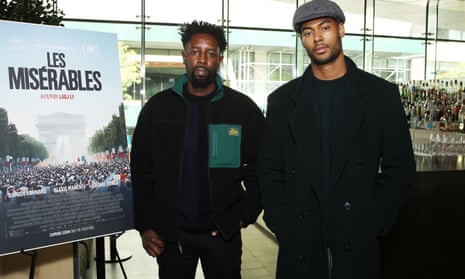The nomination of the Paris banlieue movie Les Misérables for best foreign language feature at the Oscars has been hailed as a historic moment – the first time a black film director has represented France at the Academy Awards, and for a low-budget drama about the topical issue of police violence.
The film – which won universal critical acclaim and box-office success in France – is the first full-length feature by Ladj Ly, who grew up and still lives in Montfermeil in Seine-Saint-Denis at the heart of the high-rise estates that saw the worst of the urban rioting in 2005 after the death of two young boys hiding from police.
Ly said he hoped the film’s Oscar nomination would inspire young people in France to follow their dreams. “If I win the Oscar, I’ll use that platform,” he told Agence France-Presse. “My film is politically engaged and ultimately concerns all countries.”
Les Misérables is based on a real-life event in 2008 when Ly, who had taken to documenting his neighbourhood with a camera, recorded footage of police violence. The film, which is in turns funny and tragic, tells the story of a police officer who joins a patrol on high-rise estates, where a young teenager is violently arrested.
Police are regularly accused of using excessive force in poorer neighbourhoods, particularly against black and minority ethnic young men. High-profile cases continue include that of Adama Traoré, a young man who died in police custody in 2016 after being subject to restraint, and a another called Theo who sustained serious injuries after being stopped by police in one of the Parisian banlieues in 2017, which led to nights of clashes between young people and police.

The film’s nomination comes amid a growing clamour over police violence in France – from the injuries at anti-government gilets jaunes demonstrations to deaths after arrests. The president himself, Emmanuel Macron, on Tuesday called for new measures to improve police ethics and controls.
Ly deliberately set out not to make a film that simply portrayed banlieue versus police, but which explored the difficulties and contradictions of low-paid officers themselves.
Les Misérables was shot over six weeks in part on housing estates in Montfermeil, a place which had historically inspired the atmosphere of simmering revolution in Victor Hugo’s epic novel of the 1830s.
The movie, which is released in the UK in March, won the jury prize at last year’s Cannes film festival. Macron himself was reportedly “moved” by how true to life it was. Ly has called it a film about French patriotism – it opens with kids from housing estates celebrating France’s World Cup win on Paris’s Champs Elysées before returning to their everyday hardship. The writer Éric Vuillard called it a “universal film about segregated society”.
Toufik Ayadi, one of the film’s producers, said: “Everyone will read a different type of importance into the film being nominated for an Oscar – it’s important as a film, but also politically. And it’s important for Ladj Ly’s background – this is a first-time feature film made by someone from the banlieue when it’s very complicated to make films if you’re not in the network. It was a hard film to finance, it faced a stack of constraints but managed to get made.
“For us, the biggest thing about this nomination is it means we can still believe in dreams: the dream of a kid from the banlieue who made it to the Oscars is a little bit of magic in our current society. And there’s also the fact that France has not won for a long time in the foreign language category. The fact that it’s the first time a black director has represented France at the Oscars proves things can change.”
Christophe Barral, another producer, said: “The film goes beyond just police violence, it explores misery. And we have recently seen a lot of people’s anger over misery – a misery which is the worst enemy of society.”
Ly, 39 – who is self-taught, and set up a local banlieue collective for short films – has previously made documentaries and short films in his neighbourhood. He said when the film came out that for decades there had been a taboo around police violence on housing estates.
He said he hoped the film would “make young people think, would give them a desire to pursue their dreams and know that you can start from nothing, from as low-down as it gets, and find yourself at the Oscars”.
The producers said the film had sold widely internationally and had a universal appeal. “There are abandoned neighbourhoods in the US, Brazil or UK – they are everywhere, the people change but the misery stays the same,” Barral said.
